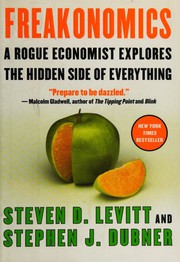
Freakonomics
By Andrea Montero Cusset, Steven D. Levitt, Stephen J. Dubner
Subjects: Sociology, Sociological aspects, 330, economics theory, Psychological aspects of Economics, high-stakes tests, Popular Culture, psychology, low earnings, Aspect psychologique, Aspectos sociales, collusion, teachers, Economics, psychological aspects, Economics -- Psychological aspects, Economics, sociological aspects, Économie politique, Nonfiction, cheating, Economics--psychological aspects, crack cocaine, Economía, Reading Level-Grade 12, Hb74 .p8 l666f 2005, Large type books, Aspectos psicológicos, New York Times bestseller, Reading Level-Grade 9, Economics--sociological aspects, Hb74.p8 l479 2006, business & economics, Sociological aspects of Economics, Psychological aspects, effect of legalized abortion on crime, Reading Level-Grade 8, education, data-mining, nyt:paperback_business_books=2012-02-25, nominative determinism, Reading Level-Grade 7, real-estate agents, parenting, social science, Hb74.p8 l479 2005, incentives, Reading Level-Grade 11, Japan Sumo Association, sumo wrestlers, Business, Socioeconomic Factors, Economia (aspectos psicológicos), Economia da informação, Aspect sociologique, illegal drug trade, Economics, Reading Level-Grade 10, Humor, Finance, Economics -- Sociological aspects, Economia (aspectos sociais)
Description: *A Rogue Economist Explores the Hidden Side of Everything* Which is more dangerous, a gun or a swimming pool? What do schoolteachers and sumo wrestlers have in common? Why do drug dealers still live with their moms? How much do parents really matter? How did the legalization of abortion affect the rate of violent crime? These may not sound like typical questions for an economist to ask. But Steven D. Levitt is not a typical economist. He is a much-heralded scholar who studies the riddles of everyday life—from cheating and crime to sports and child-rearing—and whose conclusions turn the conventional wisdom on its head. Freakonomics is a ground-breaking collaboration between Levitt and Stephen J. Dubner, an award-winning author and journalist. They usually begin with a mountain of data and a simple, unasked question. Some of these questions concern life-and-death issues; others have an admittedly freakish quality. Thus the new field of study contained in this book: Freakonomics. Through forceful storytelling and wry insight, Levitt and Dubner show that economics is, at root, the study of incentives—how people get what they want, or need, especially when other people want or need the same thing. In Freakonomics, they explore the hidden side of … well, everything. The inner workings of a crack gang. The truth about real-estate agents. The myths of campaign finance. The telltale marks of a cheating schoolteacher. The secrets of the Ku Klux Klan. What unites all these stories is a belief that the modern world, despite a great deal of complexity and downright deceit, is not impenetrable, is not unknowable, and—if the right questions are asked—is even more intriguing than we think. All it takes is a new way of looking at things. Freakonomics establishes this unconventional premise: If morality represents how we would like the world to work, then economics represents how it actually does work. It is true that readers of this book will be armed with enough riddles and stories to last a thousand cocktail parties. ButFreakonomics can provide more than that. It will literally redefine the way we view the modern world. First published in the U.S. in 2005, Freakonomics went on to sell more than 4 million copies around the world, in 35 languages. It also inspired a follow-up book, SuperFreakonomics; a high-profile documentary film; a radio program, and an award-winning blog, which has been called “the most readable economics blog in the universe.” ([source][1]) [1]: http://freakonomics.com/books/
Comments
You must log in to leave comments.